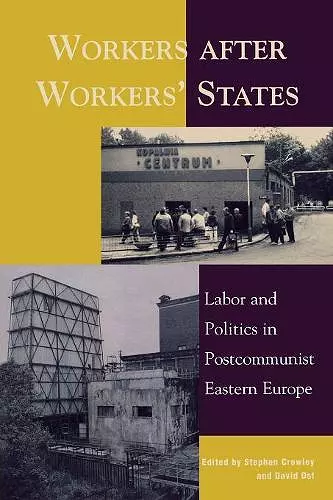Workers after Workers' States
Labor and Politics in Postcommunist Eastern Europe
Stephen Crowley editor David Ost editor
Format:Paperback
Publisher:Rowman & Littlefield
Published:19th Sep '01
Currently unavailable, and unfortunately no date known when it will be back

After decades as the official 'ruling class' of ostensible 'workers' states,' labor in Eastern Europe has fallen dramatically. Although the painful consequences of market transformation have hit workers hardest of all, protests have been surprisingly few and ineffective. More than ten years after the start of the transition, trade unions are among the weakest institutions of postcommunist society, unable to influence policymaking or secure material rewards for workers. Why, given unprecedented political freedoms coupled with such adverse economic change, has labor been so quiescent since the fall of communism in Eastern Europe? And what are the political consequences of that weakness for societies trying to build lasting democracies? This book, through the use of comparative case studies, explores the causes, extent, significance, and implications of this weakness. The ten cases-Bulgaria, Croatia, the Czech Republic, Hungary, Poland, Romania, Russia, Serbia, Slovakia, and Ukraine-focus on the status of trade unions and the relationship between labor and politics in each country. Comprising a full array of postcommunist societies, these countries represent a wide variation in labor institutions, political experiences, and economic outcomes. In their introduction and conclusion the editors consider structural, sociological, and ideational explanations for labor decline in the postcommunist era and assess the impact of that weakness on the consolidation of democracy in the region.
The individual country chapters provide invaluable detail on the development and progress of trade unions in each context. The book will obviously be read by specialists in the field, should be dipped into by country specialists who perhaps know little about this aspect of transition, and could usefully be recommended to those academics and students concerned more generally with trade unions and the collective organization of labor in the twenty-first century. * Slavic Review *
This book is a valuable contribution to discussions of the future of labor. * Labor History *
The volume as a whole is a helpful guide for understanding trends in labor power in post-communist Europe, as well as broader economic and political change both there and in other transitional societies. Recommended to academic scholars and students of post-communist Europe. Practitioners and policy-makers from the region who are interested in political aspects of union restructuring may also find the book valuable. * Industrial and Labor Relations Review *
This informative volume provides a valuable snapshot of the last 10 years of union politics in Eastern Europe. It offers a sound basis for further debates on union weakness and very suitable material for graduate courses in economic sociology, labor studies, and comparative politics, union or otherwise. * American Journal of Sociology *
A valuable collection of studies of labour and the Eastern European transition that has much to offer a wider audience. * Labour/Le Travail: Journal Of Canadian Labour Studies *
Crowley and Ost have put together a valuable contribution to the comparative study of labor in postcommunist Eastern Europe including most of the Balkans, the Ukraine, and Russia. * Balkan Academic News Book Review *
ISBN: 9780742509993
Dimensions: 230mm x 148mm x 19mm
Weight: 376g
256 pages